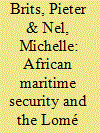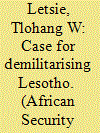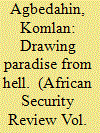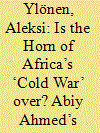|
|
|
Sort Order |
|
|
|
Items / Page
|
|
|
|
|
|
|
| Srl | Item |
| 1 |
ID:
165763


|
|
|
|
|
| Summary/Abstract |
Traditionally the African concept of security concept has been dominated by land-based conflicts with little attention being paid to maritime threats and the protection of the maritime environment. With the rapid escalation of piracy on the East Coast, the African Union (AU) was compelled to develop a joint strategy to address its changing African Maritime Domain (AMD). This was achieved by the AU’s Africa’s Integrated Maritime Strategy (AIMS 2050) in 2014, culminating in the adoption of a binding maritime security and safety charter in Lomé in 2016. The Lomé Charter should ideally focus the general provisions of AIMS 2050 so that Africa, as a continent, can take responsibility for security and economic empowerment of the AMD. This article considers various maritime security documents against the backdrop of an African context for understanding maritime security, in order to evaluate whether the Lomé Charter, as a manifestation of AIMS 2050, will realise its aspirations. Focussing on security is not sufficient and too much emphasis is placed in the Lomé Charter on restriction rather than development. Strong political will and leadership is required to facilitate implementation, identifying common security concerns to ensure better cooperative and collective strategies in a diverse implementation environment.
|
|
|
|
|
|
|
|
|
|
|
|
|
|
|
|
| 2 |
ID:
165767


|
|
|
|
|
| Summary/Abstract |
The Kingdom of Lesotho spends around five per cent of its annual budget – some 700 million Maloti ($US52.6 million) in 2017 – on the Lesotho Defence Force (LDF). Lesotho’s geographical position means that the LDF has no meaningful role regarding its primary function of defending the country from external aggression and it hardly engages in its secondary functions. In addition, the LDF has a long history of interference with democratic processes and engaging in human rights abuse. The financial resources currently allocated to the LDF could do far more for security, widely defined, if they were allocated to a number of other government expenditure categories.
|
|
|
|
|
|
|
|
|
|
|
|
|
|
|
|
| 3 |
ID:
165761


|
|
|
|
|
| Summary/Abstract |
The most critical challenges faced by war-affected communities where children have allegedly perpetrated atrocities include: finding transitional justice practices that address the needs of former belligerent children and those of victims and their communities; and helping to reintegrate child soldiers into society and avoid returning to hostilities. This paper demonstrates that these challenges can be overcome by taking a holistic approach to child soldiering transitional justice, which assimilates restorative justice and social justice. Such an approach simultaneously addresses child soldiers’ criminal accountability and pursues their psychosocial wellbeing. The findings are based on a selective scholarship supported by fieldwork that was conducted in the Democratic Republic of Congo between May and December 2014 in North Kivu province. Data was gathered through semi-structured interviews, focus group discussions and survey questionnaires based on a randomised sample of 282 participants. These included self-demobilised child soldiers, members of war-affected communities, students/learners, educators, local traditional leaders, government officials, child protection lawyers and members of non-governmental organisations.
|
|
|
|
|
|
|
|
|
|
|
|
|
|
|
|
| 4 |
ID:
165762


|
|
|
|
|
| Summary/Abstract |
This paper explores the nexus between child-soldiers’ wartime roles and their reintegration into the post-war society. Reintegration programmes do not suit all young veterans (former child soldiers). Many of these programmes do not result in their intended outcomes and literature has attempted to provide reasons for the failure or success of reintegration processes. The influence of young veterans’ war retentions, that is, skills, abilities, knowledge and practices gained through their wartime roles, on the reintegration process has not been adequately considered; this paper sets out to bridge this gap. The paper argues that wartime roles, far from being totally negative, could catalyse the reintegration process of some young veterans. While the paper partly concurs with the dominant apocalyptic description of the involvement of children in armed conflict, it argues that the experience gained from the war through combat, logistics, intelligence, reconnaissance and surveillance functions, is not always exclusively negative. Narratives collected from Liberian young veterans through in-depth interviews, attest to this. The paper also argues that the emphasis on the dominant role of killing and the harsh conditions of young veterans, tends to undermine any positive dimension of war retentions. The paper finally contests the view that there is diametrical opposition between wartime roles and post-war roles.
|
|
|
|
|
|
|
|
|
|
|
|
|
|
|
|
| 5 |
ID:
165764


|
|
|
|
|
| Summary/Abstract |
On 9 July 2018, Ethiopia and Eritrea signed a historical agreement pledging to end their mutual animosity and work for peace. The unprecedented rapprochement was facilitated by the new leadership in Ethiopia, merging interests between the two states and external mediation. This commentary looks into Ethiopian Prime Minister Abiy Ahmed Ali’s early reform initiatives and the dynamics of the rapprochement between Ethiopia and Eritrea.
|
|
|
|
|
|
|
|
|
|
|
|
|
|
|
|
| 6 |
ID:
165766


|
|
|
|
|
| Summary/Abstract |
International Organisations (IOs) are crucial actors in spearheading the global adoption of anti-money-laundering (AML) legislation. However, the extent to which AML legislation has been implemented in Zimbabwe under the aegis of the Financial Action Task Force (FATF) and East Africa and Southern Africa Money Laundering Group (ESSAMALG) may put the efficacy of legislation passed at the behest of IOs into question. This article suggests that glocalisation may enhance the international fight against money-laundering. That is to say, international standards should be applied domestically with due regard for local legislative environment.
|
|
|
|
|
|
|
|
|
|
|
|
|
|
|
|
| 7 |
ID:
165765


|
|
|
|
|
| Summary/Abstract |
This article uses the case of illegal street vending in Harare to explore the interface between urban governance and politics. Drawing on the ideas of urban governance and informal governance, it illustrates how polarisation between the opposition political party Movement for Democratic Change-dominated municipal council and the Zimbabwe African National Union Patriotic Front-led government is affecting governance in general and in particular Harare municipality’s ability to handle the illegal street vending problem. While the paper essentially identifies political expediency as the major reason why a lasting solution is elusive in handling the illegal street vending problem, it acknowledges that there are broad reasons for its persistence. Consequently, the article demonstrates some of the reasons why illegal street vending is difficult to end using the conventional methods and provides some alternatives.
|
|
|
|
|
|
|
|
|
|
|
|
|
|
|
|
| 8 |
ID:
165768


|
|
|
|
|
| Summary/Abstract |
Turkey has maintained its strategic relations with Africa at the highest level under recent AK Party governments in the field not only of low politics but also of high politics. For example, it opened its largest overseas military base in Somalia in 2017 and signed military, defense and security pacts with more than 25 African countries. This article traces the deep historical and cultural relations with Africa behind its newly evolving foreign policy identity, arguing that its booming economic power has been a significant driving force in shaping a new security strategy. It examines what the growing security involvement means for both Turkey and Africa in order to contribute to the relevant literature through a holistic approach from both theoretical and conceptual perspectives.
|
|
|
|
|
|
|
|
|
|
|
|
|
|
|
|
|
|
|
|
|